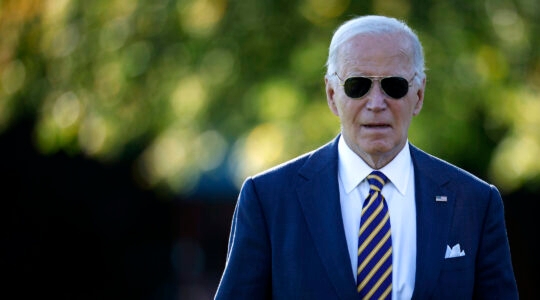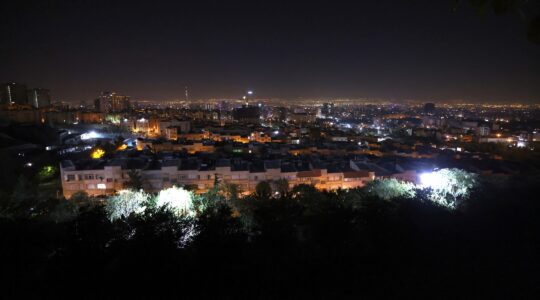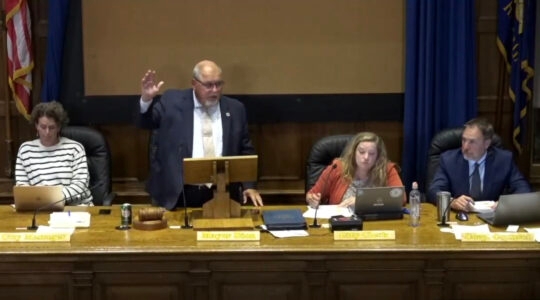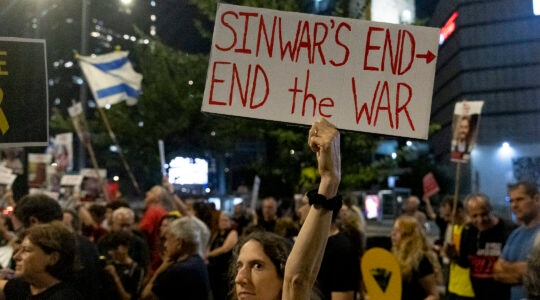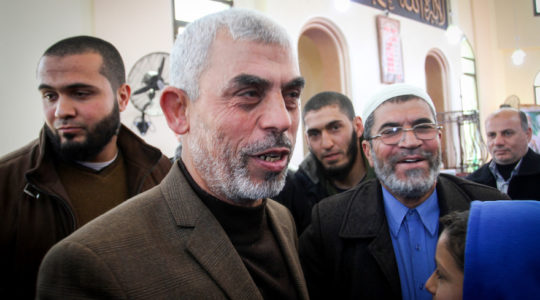NEW YORK (JTA) — For years, sanctions have been the world’s answer to Iran’s suspected pursuit of nuclear weapons.
Three times already — in 2006, 2007 and 2008 — the U.N. Security Council passed sanctions legislation aimed at obstructing Iran’s nuclear capabilities and prodding the government in Tehran into cooperating.
The result: Iran moved ahead with building clandestine nuclear facilities, installing centrifuges and enriching unranium while refusing full access to international weapons inspectors and turning down deals with the West. Last week, the International Atomic Energy Agency issued a report saying it had evidence of “past or current undisclosed activities” by Iran to build a nuclear warhead.
Tehran repeatedly has made clear that its policy toward the West — on the nuclear issue and other matters, including last year’s disputed election — is defiance and obduracy, not cooperation or capitulation.
Now, in the face of mounting evidence that Iran’s pursuit of a nuclear bomb continues unabated, pro-Israel groups and U.S. and European governments again are pushing for new sanctions.
Given that sanctions haven’t worked in the past, is there any hope that things will be different this time?
“We won’t know the answer until we actually try,” said Malcolm Hoenlein, executive vice-chairman of the Conference of Presidents of Major American Jewish Organizations, the main U.S. Jewish umbrella group on Mideast-related issues.
“Sanctions can have an impact if they’re the right kind of sanctions, if they’re not going to be put off,” Hoenlein said. “The question is implementation. It’s not moving fast enough. The Iranians only understand one language: They have to understand this is showdown time.”
For now the approach among Jewish organizational leaders who have led the campaign to halt Iran’s pursuit of nuclear weapons is to continue to promote sanctions — both by the United Nations and by individual countries, including the United States. The thinking is that sanctions currently under consideration are considerably tougher than earlier rounds and must be tried before any other options can be explored.
“If we’re willing to put meaningful, painful sanctions in place, it can work,” said Josh Block, spokesman for the American Israel Public Affairs Committee, which has been the main lobbying group pushing Congress for sanctions on Iran.
“Do we have the ability to create significant economic pain for the Iranian government? Yes. Are they willing to change their behavior based on that impact? We don’t know,” Block acknowledged.
The new U.N. sanctions would target Iran’s Islamic Revolutionary Guards Corps and more severely restrict Iran’s banking industry. For enactment, nine of the U.N. Security Council’s members must vote for them, and none of the five permanent, veto-wielding members — China, Russia, the United States, Britain and France — can block them.
Russia, an early holdout, is now sending signals it favors new sanctions, but China has yet to agree. Four more yes votes would be necessary from the 10 rotating members: Austria, Bosnia-Herzegovina , Brazil, Gabon, Japan, Lebanon, Mexico, Nigeria, Turkey and Uganda. The four votes are not yet in place, insiders say, and the date for a vote on sanctions continues to be pushed back.
Meanwhile, the U.S. Congress is set to pass broad unilateral sanctions that would target Iran’s energy sector.
As the day of reckoning with a nuclear Iran fast approaches, advocates in the Jewish community are being forced to confront the question of where to go beyond sanctions.
There are no sure answers. Sanctions have not worked so far, and the U.S. administration doesn’t appear close to considering the military option.
Even if Israel were to circumvent the United States and strike Iran, it would be hard to wipe out the country’s nuclear facilities, which are thought to include sites that are hidden, underground, scattered and heavily fortified.
Some Jewish groups have begun talking about how to live with a nuclear Iran.
Jennifer Laszlo Mizrahi, the founder and president of The Israel Project, said that even if sanctions couldn’t stop Iran from going nuclear, they still could help deter a nuclear Iran from using its weapons.
“The idea that the game is over if Iran has a nuclear device is mistaken,” Mizrahi told JTA. “As long as Iran hasn’t used a nuclear device to shoot anybody or give it to terrorists, we still have to give it a full-court press.”
It’s possible, she noted, that Iran already has obtained a nuclear device from North Korea or other clandestine methods.
“Even if they were to have a nuclear device and a rocket today, it would still be useful to have sanctions,” Mizrahi said. “They can still be dissuaded from using their weapons and giving them up.”
With the time remaining for effective sanctions to have an impact on the Iranian regime dwindling, is it time to go to Plan B?
“There are plan B’s,” Hoenlein said. “We have not advocated military action. We don’t believe that’s our role. We believe all options should be on the table, including that. If they don’t believe all options are on the table, they will never move.”
Plan B, he said, could entail anything from a naval blockade to military strikes. The United States does not yet appear to be at that point, but of course Israel at any point could move to its own Plan B.
Even as they concede that serious questions remain about the efficacy of new sanctions and other options, U.S. Jewish organizational leaders are canvassing the country and holding meetings around the world to warn about the dangers of a nuclear Iran — and not just so they can feel like they’re doing something or to give their audiences a reason to lay awake at night.
“I’m not trying to suggest this as a panacea,” said Rabbi Steve Gutow, executive director of the Jewish Council for Public Affairs, a policy umbrella group. “We still have to get the sanctions thing passed.”
Talking about the dangers of a nuclear Iran can energize people to lobby their elected representatives, press the issue at consulates and embassies, and talk to associates with business interests overseas about the imperative to isolate Iran, he said.
The point, several Jewish officials said, is to not give up.
“Because of our history, because of our teachings, I think we’ve been taught that one cannot just sit by and watch evil win,” Gutow said, citing Theodor Herzl’s famous “Im Tirtzu” line – “If you will it, it is no dream.”
Mizrahi also cited Herzl.
“I’m not optimistic about any of these things, but as Golda Meir put it, Jews don’t have the option of being pessimists,” Mizrahi said. “If every time the world said it’s impossible for Israel to accomplish something, if they’d listened Israel wouldn’t have gone back to reclaim the land, drain the swamps and build the country. I believe very strongly in what Herzl said.”

Help ensure Jewish news remains accessible to all. Your donation to the Jewish Telegraphic Agency powers the trusted journalism that has connected Jewish communities worldwide for more than 100 years. With your help, JTA can continue to deliver vital news and insights. Donate today.
